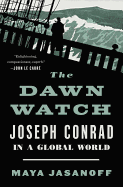
In The Dawn Watch, Maya Jasanoff (Liberty's Exile) highlights the position of early 20th-century fiction modernist Joseph Conrad at the height of Britain's leadership in commercial globalization. She focuses on four of Conrad's novels: The Secret Agent, Lord Jim, Heart of Darkness and Nostromo. All four grew out of his own experiences and touch on the great issues of his time: imperialism, moral conflict, immigration and global trade. Born in the Russian Ukraine, Conrad grew up with Polish nationalist parents shuttling in and out of prison. Largely raised by a taskmaster uncle, he went to Marseilles, France, at age 16 to become a sailor. Discouraged, Conrad left for London four years later to join Britain's merchant marine--an experience that made him fluent in English, provided a raft of stories and helped him understand many races and cultures of the world. As Jasanoff summarizes, "Conrad's novels are ethical injunctions. They meditate on how to behave in a globalizing world."
A history of the British shipping industry, colonialism, the commodity trade, slavery and indentured employment, The Dawn Watch is also a fine piece of biographical literary criticism. Illustrated with photographs, maps and facsimiles, it paints a picture of a solitary but attentive man comfortable with a world grown smaller by his travels. Perhaps Conrad was spurred by his uncle writing him after an attempted suicide in Marseilles: "You're a lazy-bones and a spendthrift... you fell into debt, you deliberately shot yourself... you have exceeded the limits of stupidity permitted at your age!" After that, "lazy-bones" Conrad became, and still stands, a towering master of modern English literature. --Bruce Jacobs, founding partner, Watermark Books & Cafe, Wichita, Kan.

